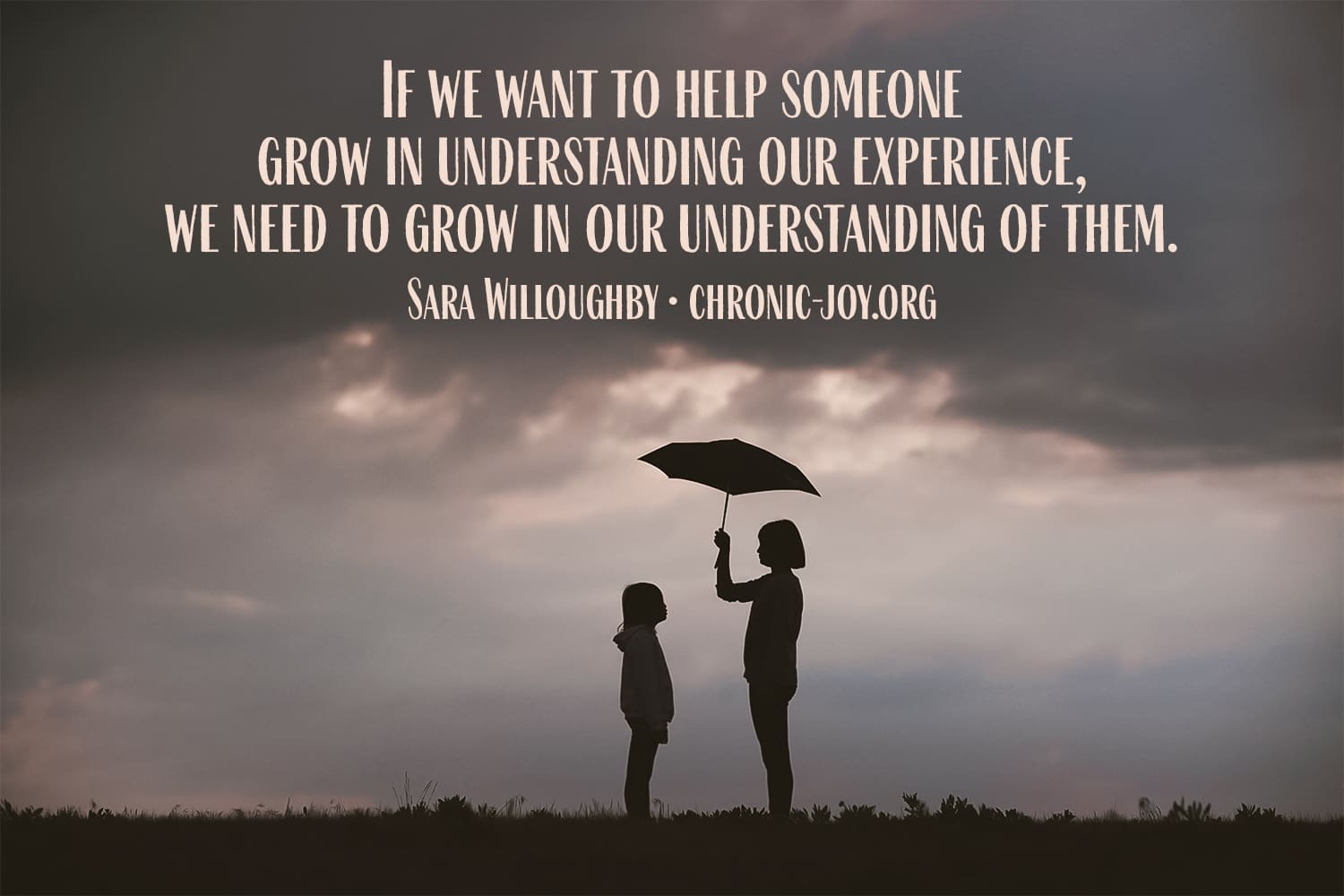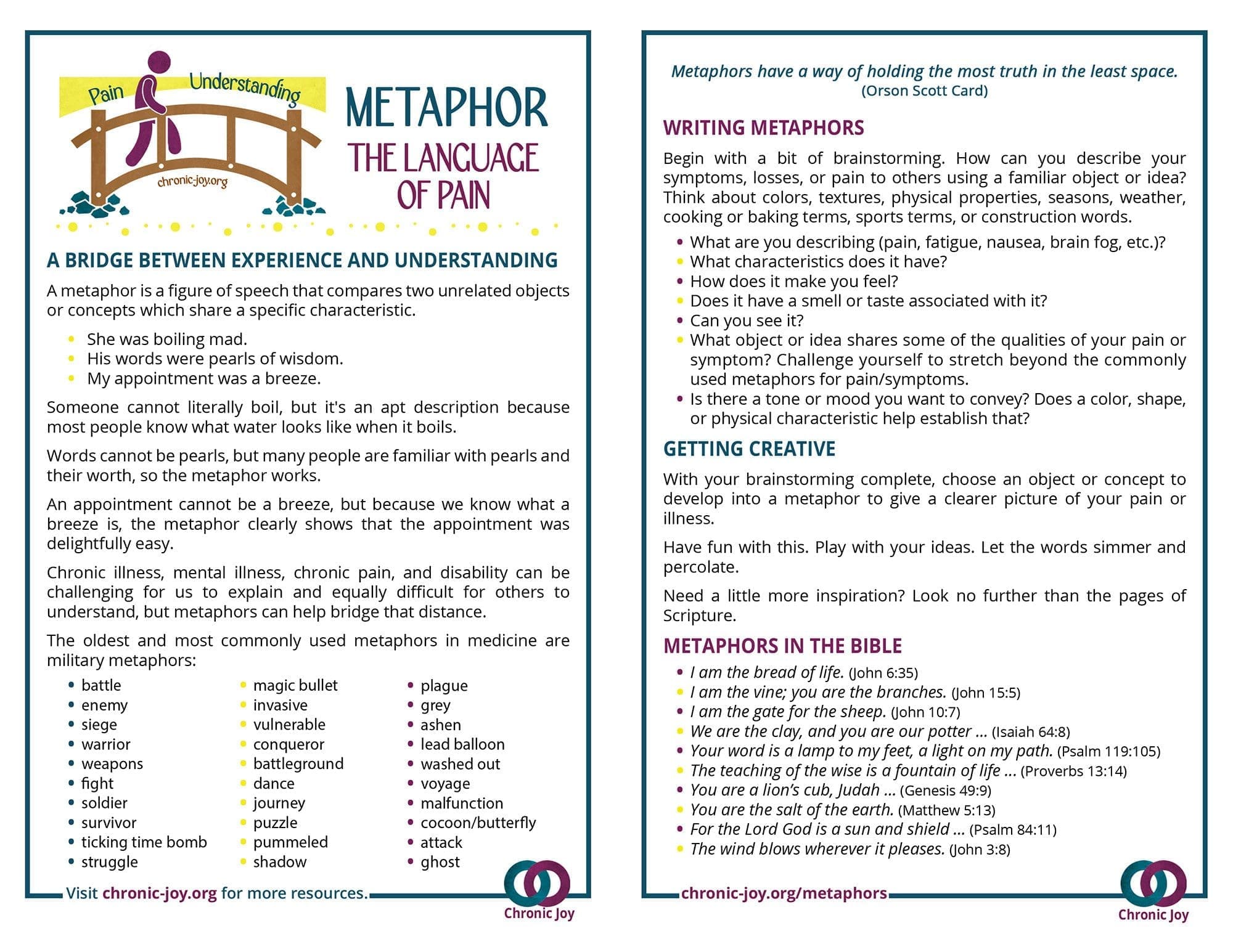
“If we want to help someone grow in understanding our experience, we need to grow in our understanding of them.” Sara Willoughby
LOVING THOSE WHO DON’T UNDERSTAND
I knew what I wanted to say, but my sick brain could not form the words. I grasped at straws to try and explain myself to my loved ones, but no matter how hard I tried (and no matter how hard they tried), they could not comprehend what I was experiencing through chronic illness.
It’s a joke among some of my chronically ill friends to simply smile and nod when someone says, “I get tired too.” – or “It must be nice not to go to school/work/etc.”
Feeling tired is valid, but it is not the same as being fatigued – they are worlds apart. Missing out on one day of school or work is nice, but years of it are heartbreaking.
“I know I don’t understand what you’re going through” are words that have made me feel most seen – most understood – in life. When someone comprehends the fact that they don’t understand you, they demonstrate that they get how hard and big this experience can be. That in itself is a form of empathy. I’m guessing some of you can relate.
Feeling Misunderstood
- Maybe it’s chronic illness, anxiety, depression, or _____________ (fill in the blank) that makes you feel misunderstood.
- Maybe it’s your sister who married young and lives with a houseful of kids while you yearn for someone to talk to about your day.
- Maybe you are an expatriate and feel like you don’t belong in your birth country or country of residence. Everywhere you go, you are faced with assumptions about who you are. You simply want to meet someone else with the same mixed experiences you have.
Each of us feels misunderstood in some way, and it can be frustrating and lonely. Let me help you feel understood by saying this: I know I can’t understand everything you’re experiencing. I get that, but I don’t get it.
Understanding Those Who Don’t Understand Us
Friend, you are worth being understood, but I want to share a challenge with you today. Everyone who misunderstands us is worth being loved. There are two reasons for this.
1. We have misunderstood others too. In some areas, maybe we still do.
Growing up, I was frustrated that no one seemed to understand my experience as a chronic illness warrior. The truth is, before I got sick, I didn’t even know what the word “chronic” meant. I didn’t understand the daily battle of unending sickness, and I didn’t know how to walk with someone through it.
Even though I wanted to understand, it took years of experience and listening to other people’s stories for me to understand. So now, I want to love those who don’t understand me by remembering my misunderstanding of others – I want to have compassion for those who don’t understand me.
2. God loves those who don’t understand us.
The second reason we should love those who don’t understand us is because God loves them, and we are His ambassadors. [We are therefore Christ’s ambassadors, as though God were making his appeal through us. (2 Corinthians 5:20).] We represent God. The context of this II Corinthians verse details how God does not hold His people’s sins against them but instead reconciles them to Himself.
Sometimes, it is hard not to hold people’s wrongs (like lack of understanding) against them. Bitterness is easy! When people don’t understand us, it is easy to latch onto frustration and toss those relationships aside. Not being understood hurts. It hurts because God designed us to be seen and loved. However, when we hold onto bitterness, we refuse to show God’s love to those He loves. Even more, we are pointing people away from Him. We are adding our lack of understanding to their lack of understanding.
How We Can Love Those Who Don’t Understand
I must address something important: Loving others who fail to understand us does not mean ignoring our own needs. Having grace for ourselves and grace for others goes hand in hand. It’s tempting to think that these things are mutually exclusive – that if we have compassion for those who hurt us, we are ignoring our own hurts, or that if we have compassion for ourselves, we must hold onto frustration for others.
Grace does not work like that.
I can sympathize with a friend who has the flu and send them a get-well card, and still take the time to grieve that my illness isn’t one I will get over in a week.
We can love people who don’t understand us by speaking in a language they are more likely to understand. If we want to help someone grow in understanding our experience, we need to grow in our understanding of them. We need to love them by meeting them where they are.
Using metaphors can build bridges of understanding. Regarding chronic illness, this can look like taking something someone is familiar with (like the flu) and explaining chronic illness based on that shared experience. “It’s like the flu, but ten times worse and never-ending.” Maybe they won’t fully understand, but there is some common ground.
Perhaps explaining your longing for marriage to your married sister can start with a different common ground experience (like your shared longing for reconciliation with your dad). While teaching English to some Bosnian friends lately, I have found that returning to an already-established concept is always helpful when explaining a new concept.
So, how can you love and understand those who misunderstand you by speaking their language today?
Making Peace with Being Misunderstood
Here is something we must recognize: not everyone will understand us. Even with patience, compassion, and speaking their language, there will be people who can’t or won’t comprehend us and our experience.
Now — take a deep breath — that’s okay. We can love ourselves (and others) by not forcing people to understand if they are currently unable or unwilling. Trying to force someone into understanding is not necessary. We can make peace with the fact that certain people just won’t get it.
We can make peace with that because there will also always be those who do get it – like God – and often, many of those around us. No matter how unique our experience is, human hearts are amazingly alike, and we share emotions even when facing vastly different situations. Just because one person doesn’t understand doesn’t mean nobody does, and we can love ourselves and others by not giving up.
Today, friends, let’s align our hearts with God’s heart for those who don’t understand us. Let’s align our hearts with His heart for us when we are grieving being misunderstood. He loves us, sees us, and understands us – so let’s love, see, and seek to understand those around us.
AN INVITATION
Metaphor can help us express difficult-to-explain things more easily. Check out Metaphor: A Bridge Between Pain & Understanding to spark new ways to communicate with others.
QUESTIONS FOR REFLECTION
1. Think of just one time when you struggled to understand an idea someone was sharing:
• a doctor’s explanation of new treatments,
• a new movement or exercise, or
• directions to a new location.
Considering your struggle, what insight might that provide when you hope someone will understand your illness?
2. List a few challenges you would like someone to understand. Then, wrestle with some possible metaphors that might help you explain them in the future.


S.G. Willoughby
Sara is the author of He’s Making Diamonds: A Teen's Thoughts On Faith Through Chronic Illness and host of the annual Diamonds Conference for chronically ill Christians. She loves to write and adventure—be it a new board game with her family, trying a weird food, or diving into a fantasy book. Sara is a TCK, a Lymie, and a Young Life Leader.

Metaphor • The Language of Pain
Chronic illness, mental illness, chronic pain, and disability can be challenging for us to explain and equally difficult for others to understand, but metaphors can help bridge that distance.

Recent Comments